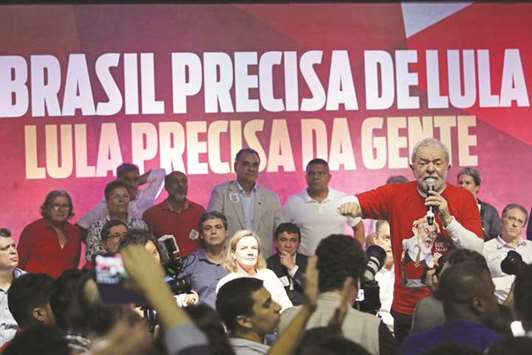Brazil’s former president Luiz Inacio Lula da Silva has never taken the easy path but on Thursday the one-time shoeshine boy turned political giant embarked on his most audacious challenge yet: to recapture the presidency – and avoid prison.
The presidential election won’t take place until October 2018 and the many potential candidates are still keeping below the radar.
Campaigning is not even officially allowed.
But when Lula took off on Thursday on a bus tour of around 20 cities, there was be no doubting what he wants.
“I am taking this big trip to see things up close and listen to people,” Lula said in a video posted on Thursday on social media.
His first stop was in the city of Salvador de Bahia, where he rode the subway to the gates of a stadium that hosted World Cup games in 2014.
The city is in the poorer northeast of Brazil and it was a Lula stronghold that first helped hoist him to power back in 2003.
He left office in 2010.
“In 2018, we are going to pick a democratic person to lead this country, and we’ve got to start to get organised now,” an impassioned Lula told a crowd of just 3,000 at a rally that started two hours late.
“I am 71 and I still have the will to fight of a 30-year-old,” an energetic Lula went on, sweating in intense humidity. “I want to go around this country and wake up the people’s conscience.”
Modelled on a marathon tour of 359 cities that Lula made two decades ago, the “Lula for Brazil” bus trip is the fiery speaker’s opening bid for a spectacular comeback.
A spokesman said there’ll be rallies at universities created during his 2003-2010 rule, meetings with small-scale farmers, and events aimed at defending anti-poverty projects now under threat from the centre-right government’s austerity cuts.
In other words, Lula will be going back to the leftist base that once made him Latin America’s most influential politician.
“He’s a candidate who needs to touch people, to hug babies. The sheer physical contact can generate iconic images and will strengthen Lula’s aura of a messianic leader,” said Paulo Moura, a political marketing specialist.
The question is: will that love extend beyond diehard fans?
When he left office after two terms, Lula was feted at home and abroad for his use of commodities-driven wealth to lift tens of millions of people from poverty.
He seemed untouchable.
But as the bus tour heads off, the fiery speaker and former union leader is a diminished figure.
His economic boom lies in tatters, his handpicked Workers’ Party successor Dilma Rousseff was booted out in an impeachment vote last year, the right is rolling back his social policies, and a slew of corruption cases threaten to put him behind bars for the last years of his life.
For the Brazilian left, Lula’s comeback bid might be the best or even only chance at salvation from a strong right wing resurgence.
President Michel Temer, who took over from Rousseff, has been speedily pushing austerity measures to fix what he says were the left’s ruinously expensive government policies.
And although these measures are unpopular, there has been little pressure on the street or in Congress to hold Temer back.
Last year the Workers’ Party was trounced in municipal elections and no leader with anything like Lula’s stature has emerged to lead the counterattack.
Critics, however, say Lula’s main motive for getting back into Brasilia’s Planalto Palace is personal: presidential legal immunity.
To the delight of many Brazilians fed up with an avalanche of graft probes against scores of politicians, Lula was convicted and sentenced July 12 to nearly 10 years in prison for taking a bribe.
He faces numerous other court cases.
So while Lula remains free during his appeal, his fate effectively has become a race between the work of the appellate court, election day and his own ability to reignite the old electoral magic.
“The bus tour in the northeast will serve a dual purpose: to push back against the conviction, giving him an image of someone who is so popular that he simply can’t be jailed – and to reinforce the Workers’ Party troops who need his charisma for their own survival,” Moura said.
Opinion polls put Lula as the frontrunner so far, but with so long to go before election day and the other candidates not yet campaigning, the numbers have to be treated with caution.
And another statistic that shows the change in Lula’s fortunes since his glory days: he may top voter intentions – but he also tops the list of candidates voters say they would always reject.

Former president Lula da Silva delivers a speech during the opening rally of his bus tour through the northeast of the country, in Salvador, Bahia, Brazil.
